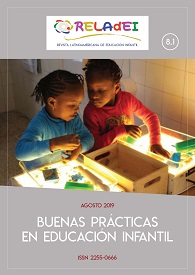Vol 8 No 1-2 (2019): Buenas Prácticas en Educación Infantil, Miscelánea
Submitted: 18-09-2018
Accepted: 09-05-2019
Published: 22-11-2019
In this text we develop a reflection on the possible contributions of the Philosophy of Language produced by Mikhail Bakhtin. We start from the concepts of dialogism, enunciation/enunciation and listening, to the analysis of verbal and extraverbal interactions between teachers and children in the collective context of child education. This is part of a PhD research whose main objective was to observe, to know and to analyze the pedagogical practice of the teachers of young children (from two to three years) and the possible dialogical relations present in the communication between them. The Bakhtinian concepts made it possible to understand the teachers’ activit in the replaning of profes-sional daily life and the interpretation in relation to the statements of the children. That’s aspects that allow us to know more about the pedagogical practice. Bakhtin’s contributions to dialogism and listening are important for the constitution of a more horizontal teaching and close to the way of life of young children, in which oral language is in formation. The condition of being a teacher, when based on a relationship between ethics and knowledge, makes it possible to respond to children in a sensitive and responsible way, by increasing the mere action, sometimes mechanical, to the pedagogical act, individual and the other collective / social. The text intends to contribute to the Pedagogy of Childhood from a dialogical teaching. The research indicates practices that are based on the shared meaning between adults and children.
Children, Teaching, Dialogism, Listening, Pedagogical Practice



